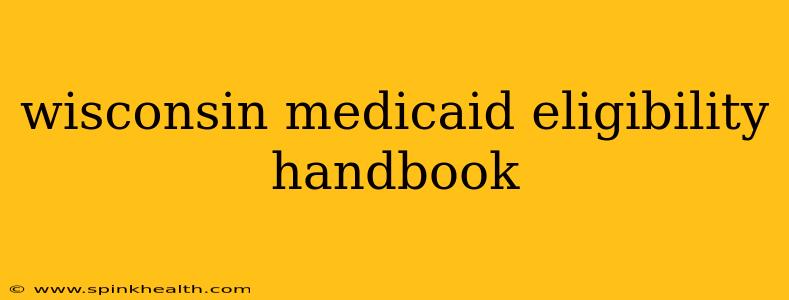The Wisconsin Medicaid Eligibility Handbook can feel like navigating a dense forest—full of intricate rules, regulations, and requirements. But don't despair! This guide will help you understand the key aspects of Wisconsin's Medicaid program, making the process less daunting. We'll unravel the complexities and answer common questions, turning that seemingly impenetrable handbook into a manageable roadmap.
What is Wisconsin Medicaid?
Wisconsin Medicaid, officially known as BadgerCare Plus, is a joint state and federal program providing healthcare coverage to eligible low-income individuals and families. It offers a range of healthcare services, aiming to ensure access to vital medical care for those who otherwise might struggle to afford it. Think of it as a safety net, designed to catch those who fall below certain financial thresholds.
Who is Eligible for Wisconsin Medicaid?
Eligibility for Wisconsin Medicaid isn't a one-size-fits-all situation. It depends on several factors, including your:
- Income: Your household income must be below a certain limit, which varies depending on your family size and other factors. The handbook provides detailed income guidelines.
- Resources: This includes assets like savings accounts, stocks, and bonds. There are limits on the amount of resources you can have and still qualify.
- Citizenship and Immigration Status: You must meet specific citizenship and immigration requirements.
- Age: Certain age groups, such as children and pregnant women, often have expanded eligibility criteria.
- Disability: Individuals with disabilities may qualify for Medicaid based on their disability status.
How Can I Apply for Wisconsin Medicaid?
Applying for Wisconsin Medicaid can be done online through the ACCESS website, or through paper applications available at various locations, including local health departments and social services offices. The application process involves providing detailed information about your income, assets, household composition, and other relevant details. Be prepared to provide documentation to support your application.
What Documents Do I Need to Apply for Wisconsin Medicaid?
The specific documents you'll need might vary, but generally include:
- Proof of Identity: Such as a driver's license or birth certificate.
- Proof of Income: Pay stubs, tax returns, and other documentation showing your earnings.
- Proof of Residency: Utility bills, lease agreements, or other documents establishing your Wisconsin address.
- Proof of Citizenship or Immigration Status: Such as a birth certificate, passport, or green card.
- Social Security Numbers: For all household members.
What Services Are Covered by Wisconsin Medicaid?
Wisconsin Medicaid covers a wide array of healthcare services, including:
- Doctor visits: Regular check-ups and treatment for illnesses.
- Hospital care: Inpatient and outpatient services.
- Prescription drugs: A substantial list of medications are covered.
- Mental health services: Therapy, counseling, and psychiatric care.
- Dental care: Basic dental services are often included.
- Vision care: Eye exams and eyeglasses.
What Happens if My Application is Denied?
If your application is denied, you have the right to appeal the decision. The Wisconsin Medicaid handbook outlines the appeals process, which usually involves submitting additional information or requesting a hearing. Don't hesitate to seek assistance from advocacy groups or legal aid organizations if you're struggling with the appeal process.
Are There Different Levels of Wisconsin Medicaid Coverage?
Yes. Wisconsin's BadgerCare Plus program offers different levels of coverage based on factors such as income and family size. These different levels may vary in the specific services covered and the cost-sharing requirements.
How Do I Renew My Wisconsin Medicaid Coverage?
Medicaid coverage is not permanent. You'll typically need to renew your coverage periodically. You'll receive notification about renewal deadlines, and you'll need to submit updated information to maintain your coverage. Failure to renew on time could result in a lapse in coverage.
Navigating the Wisconsin Medicaid Eligibility Handbook requires careful attention to detail and a thorough understanding of the requirements. This guide provides a starting point, but it's always recommended to consult the official handbook and seek assistance from qualified professionals if needed. Remember, accessing vital healthcare shouldn't be a confusing or overwhelming process. With the right information and support, you can successfully navigate the system and secure the healthcare coverage you need.

